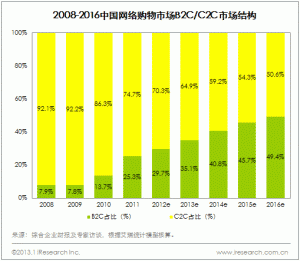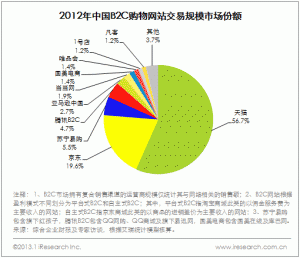Online retailing in China is going through a period of exceptional boom. Regardless of world economic condition, online retailing in China has experienced an explosive growth. Customers appreciate online price advantages over offline stores and love purchasing online. The number of online buyers reached 310 million by the end of 2013, quadrupled from the figure in 2009. And the total online sales achieved 1184 billion RMB with an annual growth of 42.0%. It is estimated that the figure will reach 4000 billion RMB in 2017. Among best-selling products, the categories of apparels, accessories and footwear won the first place, followed by cosmetics and electronics.
Though metropolitan cities account for the main part of online shopping sales, the sales contribution from second tier cities has shown a steady increase. The top 10 cities of online sales are Shanghai, Beijing, Shenzhen, Hangzhou, Guangzhou, Nanjing, Suzhou, Tianjin, Wenzhou and Ningbo.
Electronics and information industry is chosen as one prioritized industry for governmental assistance since 2006, which is a strong support for e-business. Simultaneously, the rapid economic development raises the level of dispensable income. The competition between telecom companies has made Internet connection more affordable and finally contributed to the popularity of online services, including online shopping.
B2C Market Creates Large Opportunities for Businesses
Taobao is the largest online shopping marketplace in China. It operates under the same business model as eBay, providing an online marketplace, payment solutions and technological infrastructures to match buyers and sellers. The annual sales of Tmall in 2013 were over 1000 billion RMB. In 2012, Tmall dominated 56.7% market share in B2C market, followed Jingdong (19.6%) and Su Ning (5.5%). Some other second-tier players are Amazon, Dangdang, Guomei, YHD and VIP.com.
In 2013, the increase rate of B2C market (68.4%) was much higher than C2C market (30.9%) online. The reason propelling this trend can be summarized in three aspects.
First, from the market side, C2C market is tending to be mature and stable, while B2C is a beginning market with less barriers of entry.
Second, from the enterprise side, apart from traditional B2C e-business websites, businesses without online sales channels become aware of the importance of e-business.
Third, from the customer side, with the gradual development of online shopping, customers` opinion towards online products has been changed with increasing demand of value for money. Compared to products provided by C2C market, the value of B2C products is believed to be better guaranteed. It is estimated that till 2016 the sales of C2C market will draw equal with that of C2C market.

Main Factors Influencing Online Buying Decisions
Major factors affecting online purchasing decisions include reputation of sellers, after sales services, other buyers’ feedbacks, delivery timing and quality, price, brand recognition, web surfing speed, promotions, advertisements and user interface of websites. Internet, friends and families are major sources of information for online shopping websites. These channels have outpaced the traditional offline advertisements. Among online advertising tools, important components are search engines advertisements and links exchange with other websites targeting similar group of audiences.
Other Trends in the Chinese Online Shopping Market
With more international enterprises expected to enter Chinese online shopping market and more online specialist stores to emerge, complementary services like logistics and payment will continue to be improved. In addition to manufacturers, large retailers likeCarrefour also open their online stores. Their presence will provide morechoices to customers and have great impacts on online businesses. Another trend is, to defend against large online competitors in their advantages of scale economies, a number of online SMEs have formed alliances and share online expertise, marketing techniques, lists of customers, and hold joint promotional activities periodically. The goal of joining forces is to maximize sales at smallest expense by combining different types of online shops which do not involve direct competitions.
Advices for Foreign SMEs
For market entry strategies, foreign companies could set up their own representative offices or work with local agents, distributors or resellers for importations. For those who do not have business experience in China, it is suggested to collaborate with a well-established local partner in the beginning.
To exploit the local knowledge of partners, the preparation is not only an online store registration but also a complete planning covering logistics, marketing campaign, legal issues (e.g. import permit for certain products such cosmetics and foods, counterfeiting problem), market and customer analysis (e.g. buyer preference and purchasing habits).
In terms of online expansion strategies, with Internet-based franchise concept, manufacturers grant other independent franchisees the right to sell the products on franchisees’ web shops and provide supports. Brand companies should select trustful partners who are determined to ensure service levels and implementations.
It is important for foreign companies to operate in a Chinese way. First, companies should understand the market and target customers. Second, to provide convenient and flexible payment methods, for instance, fund transfer via post and banks, third party payment systems like Alipay, Tenpay and Pay Bao as well as cash on delivery, is a good way to prevent customer dissatisfaction. Third, interactive communication via instant messengers is extremely essential for online shopping in China. Usage of Aliwanwan, QQ and MSN messenger helps to promote the product and increase the sales. In summary, localization, flexibility and innovation are primary principals to success.
Daxue Consulting, Market research in China






